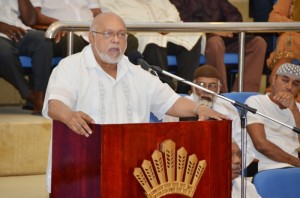
In light of the revelations resulting from an undercover drug sting operation, which linked cocaine traffickers in Guyana to the Italian mafia in the United States of America, President Donald Ramotar on Wednesday said that he asked his Home Affairs Minister Clement Rohee to seek international help to go after local connections. “I have directed the Minister of Home Affairs to write to the United States to ask them to give us the information that they probably have and to extend to them our commitment, our full cooperation to fighting these and bringing any of these to justice in our country. Guyana must not be a safe haven for any of these types of criminals,” Ramotar said while addressing a Guyana Defence Force event.
The recent sting operation led to the arrest of almost two dozen people in the U.S. In an invited comment, Rohee told media operatives that he has not received a report on the matter and is waiting on the law enforcement agencies to furnish him with the necessary report. He also expressed optimism about the recent drug sting operation, noting that whenever large volumes of cocaine are seized in any part of the world, the fight against drug trafficking advances. The minister is calling on the U.S. authorities to provide any available information to Guyanese law enforcement authorities, noting that if there are drug links to Guyana, the government will join them in dismantling the connections.
Meanwhile, Opposition Leader, retired Brigadier David Granger met with the hierarchy of the Guyana Defence Force (GDF) on Wednesday morning and expressed concerns about the extremely grave reports linking Guyanese narco-traffickers, the Mexican drug cartels, and the Italian mafia. Granger as such is calling on the government to replace the National Drug Strategy Master Plan, which expired more than five years ago. And the Guyana government said it is awaiting a report from its security agencies on the issue.
Moments after leaving Camp Ayanganna, Granger said the situation was one that required an immediate and forceful reaction from the government of Guyana. Granger explained that the meeting with the GDF top brass was to call attention to the gravity of the situation and to give support to the defence force in filling a void that was opened in the national anti-narcotics strategy.
He added that the administration seems to be in no hurry to implement a new National Drug Strategy Master Plan. “Everyone knew when it expired in 2009, it would have had to be replaced and there is no justification for waiting five years for a replacement,” Granger added.
The opposition leader believes that the absence of the plan facilitates the continuation of the cocaine trade in Guyana. Granger recalled the 2000-2008 period when well-known international narco-traffickers brought in sophisticated weapons which allegedly led to the demise of several Guyanese in Buxton, Lusignan, and Bartica. He said he would not want to see a reoccurrence of the deadly period.
APNU support for army
The APNU leader has asked GDF Chief-of-Staff, Brigadier General Mark Phillips to indicate to the coalition through the National Assembly what assistance it can render to strengthen the technical arms of the army, particularly in the field of aviation, coastguard and land assets which can lead to the interdiction of narcotics coming into Guyana.
Referencing an illegal airstrip that was built on the Corentyne a few years ago, Granger said the person who built the facility is walking free in Guyana. The opposition leader added that his coalition is aware that narcotics are entering Guyana by the planeloads, but unfortunately only the small couriers are intercepted.
He noted that with the recent report in the international press that cocaine is leaving Guyana in large volumes in fish, pineapples, wood, and other products, APNU is calling on the GDF to employ its assets to do what the Home Affairs Ministry seems incapable of doing.
Granger said the army chief-of-staff promised to discuss the issue with senior ranks, while confirming that he has already taken guidance from the Disciplinary Forces Commission (DFC) which calls for the strengthening of the GDF’s technical arms (air and maritime).
Inadequate resources
Phillips also revealed that they are in the process of acquiring a number of vessels, but Granger noted that these are classified as insured patrols and are not capable of tracking down narco-traffickers and contraband dealers on the high seas. “He does not have sufficient assets to cover the entire land borders and internal part of the country,” the retired brigadier said.
He added that the APNU is committed to supporting any legitimate actions or requests by the defence force in whatever measures are brought in the budget to bring an end to narco-trafficking in Guyana.



